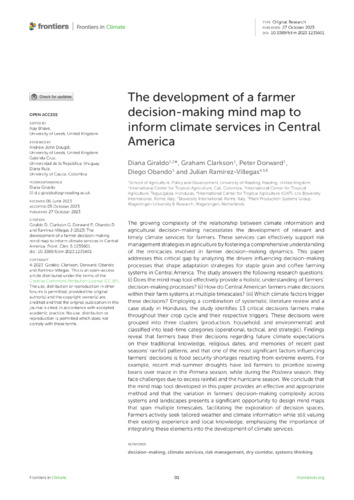The development of a farmer decision-making mind map to inform climate services in Central America
The growing complexity of the relationship between climate information and agricultural decision-making necessitates the development of relevant and timely climate services for farmers. These services can effectively support risk management strategies in agriculture by fostering a comprehensive understanding of the intricacies involved in farmer decision-making dynamics. This paper addresses this critical gap by analyzing the drivers influencing decision-making processes that shape adaptation strategies for staple grain and coffee farming systems in Central America. The study answers the following research questions: (i) Does the mind map tool effectively provide a holistic understanding of farmers' decision-making processes? (ii) How do Central American farmers make decisions within their farm systems at multiple timescales? (iii) Which climate factors trigger these decisions? Employing a combination of systematic literature review and a case study in Honduras, the study identifies 13 critical decisions farmers make throughout their crop cycle and their respective triggers. These decisions were grouped into three clusters (production, household, and environmental) and classified into lead-time categories (operational, tactical, and strategic). Findings reveal that farmers base their decisions regarding future climate expectations on their traditional knowledge, religious dates, and memories of recent past seasons' rainfall patterns, and that one of the most significant factors influencing farmers' decisions is food security shortages resulting from extreme events. For example, recent mid-summer droughts have led farmers to prioritize sowing beans over maize in the Primera season, while during the Postrera season, they face challenges due to excess rainfall and the hurricane season. We conclude that the mind map tool developed in this paper provides an effective and appropriate method and that the variation in farmers' decision-making complexity across systems and landscapes presents a significant opportunity to design mind maps that span multiple timescales, facilitating the exploration of decision spaces. Farmers actively seek tailored weather and climate information while still valuing their existing experience and local knowledge, emphasizing the importance of integrating these elements into the development of climate services.

